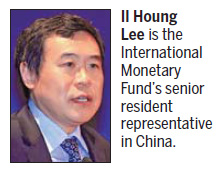Business
Renminbi remains increasingly desirable for global markets
By Zhou Yan (China Daily)
Updated: 2010-11-12 08:09
 |
Large Medium Small |

SHANGHAI - The Chinese yuan will remain attractive internationally due to the nation's rapid economic expansion and gradual opening-up of its capital account, officials and industry experts said.
"The internationalization of renminbi is likely to pick up," Il Houng Lee, the International Monetary Fund's senior resident representative in China, said on Thursday at a financial conference in Shanghai.
The level of the yuan on the global stage in the next decade may become as high as the Japanese yen was over the past 20 years, Lee said.
The Japanese currency is widely used as a reserve currency after the US dollar and the euro.
A possible route for the currency's internationalization will initially probably be through East Asia, along with the circulation of some other key Asian currencies, Lee said.
"Asia as a bloc is increasing much faster than other regions, suggesting a sizable expansion of its financial market," he said, adding that China currently has negative net export to the Associations of Southeast Asian Nations, Japan and South Korea, which could help promote the yuan in the region.
China has stepped up the liberalization of the yuan since December 2008, when it began to sign currency swap agreements with several countries and regions, including South Korea, Indonesia and Argentina.
In June, the People's Bank of China, the country's central bank, expanded its renminbi cross-border trade settlement scheme to 18 more regions in China after piloting it in five cities, including Shanghai. All foreign trade partners are now permitted to use the yuan to settle accounts with firms in the regions.
The Bank of China, the country's fourth-largest lender in terms of assets, said renminbi cross-border trade settlement services exceeded 80 billion yuan ($12 billion) in business by the end of October.
In the next five years, cross-border trade settlement with the yuan will grow explosively, said Ren Xinjian, director of the Finance Research Institute at the Shanghai Academy of Development and Reform.
The People's Bank of China said in August that it would open its interbank bond market to offshore financial institutions on a trial basis, a big step in terms of the opening-up of China's capital account, which will increase the yuan's attraction for foreign investors.
All these policies, which have provided more opportunities to invest surplus renminbi productively, are evidence of the government's desire for the renminbi to become more international.
They also give trade partners and investors great comfort that the currency will become a more prominent global currency, said Lisa Robins, vice-chairman and managing director of Treasury & Securities Services at JP Morgan, China.
In May, her company received approval to provide renminbi cross-border trade settlement services through its locally incorporated bank's Shanghai branch.
"I'm very optimistic about the outlook for the yuan as another significant currency in a corporation's toolkit," she said.
The yuan has advanced by more than 2 percent against the dollar since China initiated foreign exchange reform in June this year after being pegged to the US dollar for two years.
China Daily